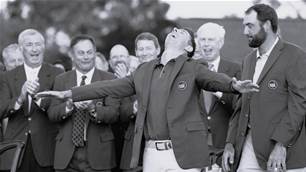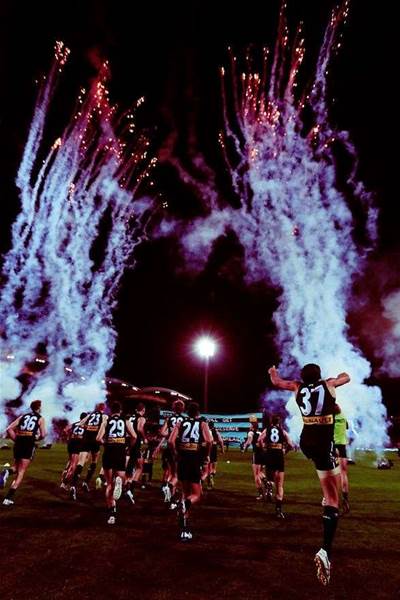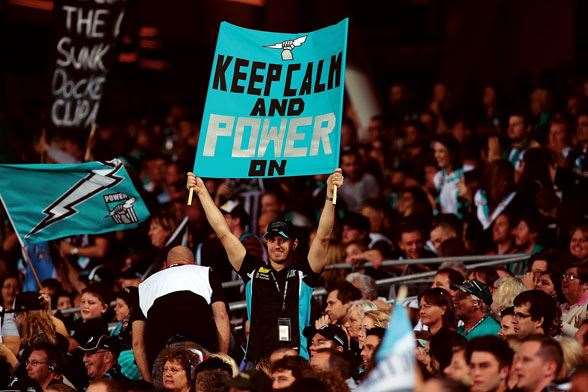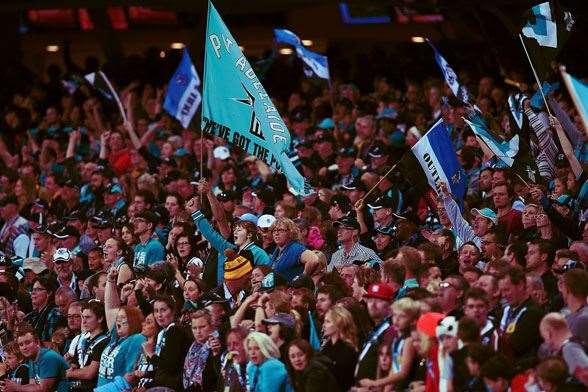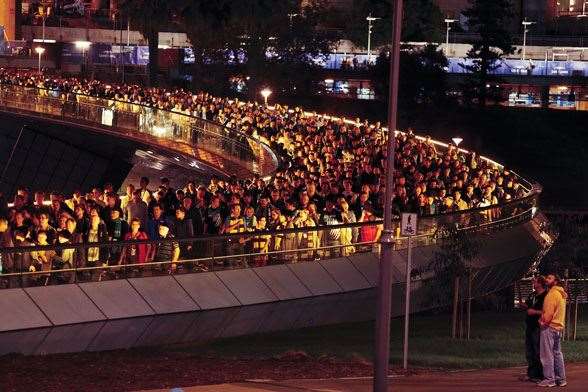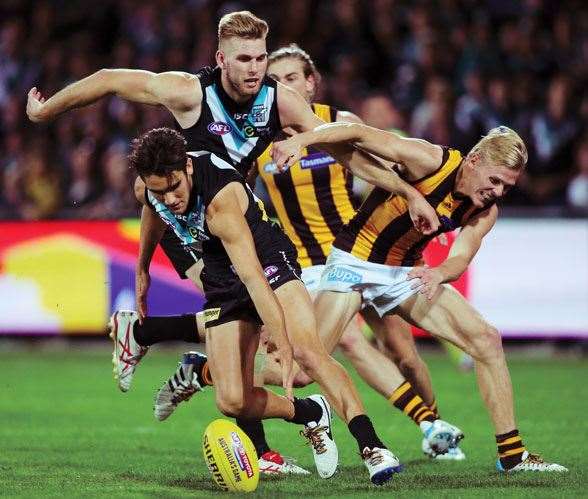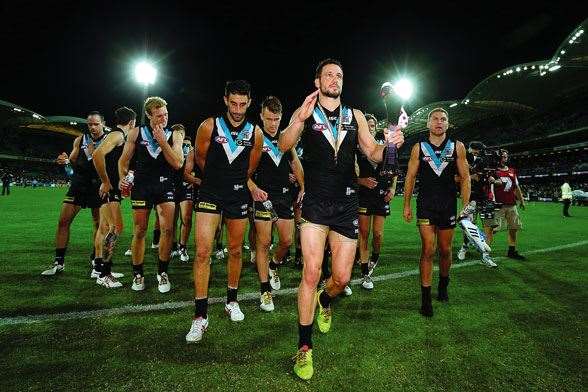When things get as bad as they did for the Port Adelaide Football Club, the only way is up.
 Port Adelaide Power prepares to number-up against the Hawks at the Adelaide Oval. (Photo: Getty Images)
Port Adelaide Power prepares to number-up against the Hawks at the Adelaide Oval. (Photo: Getty Images)It is a straightforward question – maybe a little too straightforward for his liking – but Port Adelaide captain Travis Boak isn’t quite ready to answer it out loud. Not publicly anyway. His responses have so far been devoid of the cliches and rehearsed lines commonly trotted out by elite athletes, media trained within an inch of their lives. But this particular question seems to trouble the affable and easy-going Boak. He stammers, searching for the right reply. The words seem to stick in his mouth as he hesitates, unsure how to respond.
Can Port Adelaide win this year’s AFL premiership?
It is as though Boak believes that by giving voice to the very possibility of his team winning the premiership that he might make it all disappear just as quickly as the words leave his lips, like a secret wish doomed to fail the moment it’s shared with others.
Finally, he plays for safety and offers his first line and length response of the interview. “We think our best footy is good enough to match it with the best sides in the competition.” This is the closest Boak will come to expressing what a growing number of AFL pundits believe. Port Adelaide can win this year’s AFL premiership. Though he demurs publicly at the suggestion, Inside Sport senses that Boak wants to say it. That he wants to shout it. That he wants to howl it at the sky and tell anyone who’ll listen that he believes Port Adelaide can be this year’s AFL premiers.
Try as Boak might to play down the possibilities, expectations are growing around the black, white and teal men from Alberton. The murmurings of promise which began last year and grew to a constant thrum a few weeks into the season are now approaching a roar. Boak’s team is drawing ever closer to the established powerhouses of the competition in the AFL pecking order, but for now, circumspection is the order of the day. No point upsetting the apple cart by making any grand declarations just yet.
TROUBLED TIMES
That Travis Boak is even fielding questions about holding the premiership cup aloft is a source of amazement to those who have followed his club’s fortunes in recent times. If John Howard’s political resurgence made him the self-proclaimed “Lazarus with a triple bypass” of Australian politics, then Port Adelaide’s Phoenix-like rise from the ashes has the club staking its own claim to a resurrection story to rival any in the history of Australian sport.
Less than two years ago, as the AFL cooed and coddled its two newest bubs entering the competition in non-traditional AFL states (read rugby league strongholds), Port Adelaide languished in the background as the troubled son of the AFL fraternity. The league’s administration wasn’t quite sure what to do with this once-proud club which appeared rudderless off the field and impotent on it. It is difficult to overstate just how dire Port Adelaide’s predicament was. The club had sacked its head coach mid-year, the supporter base was divided, its chairman had resigned at a tearful press conference, home ground attendances were woefully poor and its error-ridden and ramshackle playing style saw the Power anchored to the foot of the AFL ladder.
Such was the extent of Port Adelaide’s on-field ineptitude that it gave rise to an amusing YouTube clip featuring Port Adelaide versus The Bye, in which the bye won courtesy of a clumsy rushed behind at the hands of the Power’s defenders. Bereft of playing, coaching and administrative talent, the club was widely derided as the basket case of the competition. “We had two key leadership positions vacant, the club was in crisis and performing badly; it was a bit of a calamity,” says Keith Thomas, Port Adelaide’s current CEO. “It was a really dark and sombre place that we were in, and the media smashed the living daylights out of us. It was pretty horrid.”
To compound matters, Port Adelaide struck rock-bottom at the worst possible time. In the normal course of events, the AFL’s equalisation policy allows a struggling club to be propped up with high draft picks, taking its choice from the most talented junior players in the country – but this was not to be for the Power. With the AFL keen for its expansion clubs to have an immediate impact on the competition, the Gold Coast and Greater Western Sydney teams were given fistfuls of high draft picks to bolster their playing lists, leaving the Power floundering in the middle-to-lower reaches of the draft order when ordinarily they’d have had their pick of the bunch. Port Adelaide seemed destined to dwell in the AFL cellar for the next decade, leading many to question the very viability of the club’s continuing presence in the competition.
THE DAWN OF CHANGE
The language of sports journalism is prone to exaggeration and hyperbole as it seeks to gain traction in the thrill-a-minute, 24/7 collection of newsfeeds, sound bites and click-bait thrust at consumers. A star player injuring his hamstring is heralded breathlessly by overly exuberant reporters as a “tragedy” for the game, while a narrow loss is described as “heartbreaking”. Against this backdrop there are rare occasions when genuine tragedy does strike, giving pause for thought and reason for perspective.
While taking part in his club’s end of season trip following the 2012 season, Port Adelaide midfielder John McCarthy died in Las Vegas. This sad event proved both the nadir and the turning point for the club. “I think the trouble the club was in got so dire both on and off the field that it really demanded change,” says David Koch, Port Adelaide’s Chairman. “It was one of those unique moments in an organisation’s history when fundamental change was needed and demanded just for the survival of the organisation. It allowed a new team of people to become involved, and to set the direction of the group. It was a chance to renew the group, to set new objectives and new values, and to make some really important decisions.”
If the club was to step back from the abyss and adopt a new approach, it recognised early that it couldn’t afford to try and become a Collingwood-lite or a poor man’s Hawthorn. The Power had to forge its own path, re-engage with its heartland, invest in new people and create a positive culture. The change process required of Port Adelaide had to be an entirely organic one. The appointments of Koch and Keith Thomas signalled the start of a new direction for the club off-field, and they set in place measures to turn around the club’s fortunes on it.
As a suburban-based club, Port Adelaide needed to take risks and make some bold moves if it was to have any hope of resurrecting its fortunes and regaining some relevance in the national competition. With the impending move away from its cold and windswept stadium on the outskirts of Adelaide and into the heart of the city at the newly re-developed Adelaide Oval, Port Adelaide couldn’t afford to limp into its first year at its new home ground. It needed to be enterprising; to be thinking outside the square. Most of all, it needed to start winning some football matches.
POWERING ON
At a time when Brisbane, Collingwood and Essendon had all opted for favourite sons of their respective teams to be head coach, Port Adelaide selected a man with no previous connection to the club. Despite being highly credentialed, Ken Hinkley had been passed over for four other head coaching jobs prior to his appointment at Port Adelaide. With coaching buzz words and a mastery of flashy PowerPoint presentations to club boards seeming the surest path to a head coaching position, Hinkley’s appointment was a victory for substance over style.
No-nonsense and without pretensions, Hinkley is a throwback to more traditional coaching values; his straight-talking demeanour immediately resonated with the working class supporter base of Port Adelaide. He had served a lengthy coaching apprenticeship during Geelong’s most successful modern era and later at the fledgling Gold Coast side, and was well-equipped to take his new club and mould it into his own vision. In his first year as head coach, Hinkley took the club to its first finals campaign in six years, defeating Collingwood on the MCG in the first week of the finals and leading Geelong at half-time in the semi-final the following week. In a season dominated by the off-field Essendon doping saga, Port Adelaide provided the compelling on-field good news story the league was looking for.
This year many predicted second-year blues under Hinkley and a resultant fall down the ladder as the club faced a tougher draw and opposition teams which no longer underestimated the Power outfit. Instead, the club has doubled down on its 2013 success, galvanising its supporter base and attracting new fans. Port Adelaide has shown the doubters that last year’s achievements weren’t a case of beginner’s luck under a new coach, but rather the start of what it hopes will become a sustained period of success for the club.
Determined to play the brand of tough and uncompromising football that brought it 36 SANFL premierships to go with its maiden AFL flag in 2004, the club has put a premium on relentless defensive pressure and winning contested football, but is also not afraid to attack the goals once the ball is in hand. In an AFL season shaping up as the lowest-scoring since 1968, the Power has bucked the trend, throwing loose the shackles and playing free-flowing, attacking football to contrast the ho-hum on-field play of most other teams. “We’ve said we want to be brave with the ball because the game now challenges us so much with the defensive aspect, that if you’re not brave with the ball, you find it really difficult to score,” says Hinkley. “As a result of that, we play quite an exciting brand of football when we’ve got the ball.”
Travis Boak is revelling in the team’s attacking style. His own game has benefited from this new approach, earning him his first All-Australian selection last year. “We’ve been given a license to take the game on and go out there and be brave,” says Boak of his club’s playing style. “As soon as we’ve got the ball, we just take the game on and go as quick as we can.” It is this freewheeling brand of football which has seen broadcaster Channel Seven label Port Adelaide “the most watchable football team in the country”.
In an era of dour, defensive football, Hinkley has taken a contrarian approach by encouraging his team to take risks, to be enterprising, and to play with the vim and vigour which typified Hinkley’s own playing style at Geelong in the early ’90s. The club’s newfound dogged attack on the football, combined with its fleet-footed running game, has earned the attention of rival clubs and plenty of new supporters along the way.
In a season notable for its low crowd numbers across the country, Port Adelaide’s home ground attendances and club memberships have reached all-time highs, as fans have been drawn to the Power’s exciting and high-scoring style of play. In the process, Port’s rapid rise from cellar dweller to premiership contender has made a mockery of accepted wisdoms about “rebuilding phases” and “five-year plans” that struggling clubs so often seek to employ in times of crisis. Sharp-eyed supporters from other clubs will begin to take note. They’ll start expecting that their own clubs copy the Power’s model for success, instead of watching on silently as their teams wallow in protracted periods, where much development is promised but little tangible improvement is made. The Power has given hope to other clubs towards the bottom of the ladder, who now look to Port Adelaide as having provided a paradigm for how to undertake successful cultural and on-field change.
THE PATH AHEAD
Such was the Power’s strong showing in the first half of this season that the weight of expectation is one the club can no longer ignore, despite its attempts at circumspection. Having plumbed the depths of mediocrity in recent years, it’s determined to prove the results of these past two seasons aren’t merely flash-in-the-pan, but instead the beginning of a prolonged period of success. After all, this isn’t a team having one final belated roll of the premiership dice before its core group of players exits stage left and into retirement, plunging the team back down the AFL ladder. “Everyone involved with the club wants sustained success, not just a one-off performance,” says Ken Hinkley. “Port is a club which demands success. We want to be one of those great clubs that have been up around the top of the ladder for a long period of time. We want to make sure our football club is able to do that for a long period of time.”
Running an eye over the Power list, there’s more than a hint of the ’93 Baby Bombers in this season’s outfit. Young and fit, playing fearless and attacking football, they’re unencumbered by the worries and conservativeness that age brings and appear to know no limits to their potential. The team is happy to play the underdog and sneak up on the competition’s established powerhouses who still don’t believe their own time may have passed them by.
Despite the bevy of high picks available to the two expansion clubs over the past few years, Port Adelaide was able to secure Ollie Wines and Chad Wingard, two players who have already outshone many of their more highly fancied draft contemporaries. At 19, Wines has the baby face of a Renaissance cherub and the broad frame of an Alberton bricklayer. His battering ram of a body and fearless attack on the ball allow him to burst-open packs of players and emerge with Sherrin in hand. Such was his immediate impact on the competition that Wines earned a Rising Star nomination in his very first AFL match last season.
While Wines is the tough young workhorse who garners the hard ball for the Power, team-mate Wingard provides the polish and the show-reel of highlights for the evening news. Twenty-year-old Wingard’s portfolio of acrobatic marks, thrilling goals and match-winning performances earned him All-Australian selection in just his second year in the competition, becoming the youngest player to achieve this honour in 20 years. With ball in hand the graceful Wingard moves like a puck across an air-hockey table, all warp speed and fluid movements.
Wingard’s first 50 matches have Power supporters salivating at the prospect of watching his inside-outside combination with Wines for the next decade. It’s a one-two punch that has the respect and envy of other AFL clubs. With the third-youngest playing list in the AFL after Greater Western Sydney and the Gold Coast, the Power looms as a potential premiership threat for years to come. “I really want success for this club, because they’ve been through so much hard work, so much pain on and off the field,” says Travis Boak. “In the next few years I want this group to be consistently at the top of the ladder, consistently performing in big games and then chasing that final success in the last week of September.”
While his allusion to success in the last week of September may have let the premiership genie out of the bottle, the premiership cup remains very much within Boak’s reach.
Related Articles

Feature Story: Moving the Needle

The Aussies at The Open
